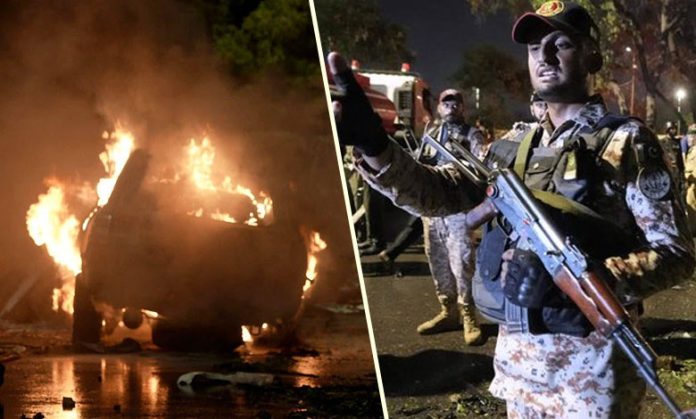Responsibility for a late-night bombing that targeted a convoy with Chinese nationals outside the country’s largest airport, killing two workers from China and wounding eight people claimed by a Pakistani separatist group, officials and the insurgent group said Monday.
The attack by the Baloch Liberation Army outside the airport in the southern port city of Karachi was the latest deadly assault on the Chinese in Pakistan and came a week before Islamabad is to host a summit of the Shanghai Cooperation Organization, a security grouping founded by China and Russia to counter Western alliances.
The explosion, which the BLA said was the work of a suicide bomber, also raised questions about the ability of Pakistani forces to secure high-profile events or foreigners in the country. Among the wounded were also police officers who were escorting the Chinese convoy when the attack happened.
Pakistani news channels broadcast videos of flames engulfing cars and a thick column of smoke rising from the scene. Troops and police cordoned off the area. On Monday, counterterrorism officials were investigating how the attacker reached Karachi, Pakistan’s largest city.
The spokesman for the separatist group, Junaid Baloch, said Monday that one of their suicide bombers targeted the convoy of Chinese engineers and investors as they left the airport. The Baloch Liberation Army is mainly based in the restive southwestern Balochistan province but it has also attacked foreigners and security forces in other parts of Pakistan in recent years.
The Chinese Embassy in Islamabad said Chinese staffers working at the Port Qasim Electric Power Company — a coal-powered power plant that’s a joint China-Pakistan venture — were in the convoy when it came under attack around 11 p.m. on Sunday. Two Chinese nationals were killed and one was wounded, the embassy said and added, without elaborating, that there were also Pakistani casualties.
Pakistani security officials say a police bomb disposal unit in Sindh province, where Karachi is the capital, had cleared the road outside the airport ahead of the movement of the Chinese convoy, which was being escorted by police and security officials in several vehicles.
Pakistan’s Ministry of Foreign Affairs denounced the bombing, saying it was a “heinous terrorist attack near Karachi airport.”
Pakistan’s Prime Minister Shehbaz Sharif said he was shocked and saddened, describing the attackers as “enemies of Pakistan” and promising the perpetrators would be punished.
“I strongly condemn this heinous act and offer my heartfelt condolences to the Chinese leadership & the people of China, particularly the families of the victims,” he wrote on the social media platform X.
“Pakistan stands committed to safeguarding our Chinese friends,” he added. “We will leave no stone unturned to ensure their security & well-being.”
Later, Sharif met with the Chinese Ambassador Jiang Zaidong to assure him that he would personally supervise the investigation into the attack.
Earlier, Interior Minister Mohsin Naqvi briefed Zaidong about the investigations.
Authorities estimate that the BLA, which Pakistan and the United States have designated a terrorist organization, has around 3,000 fighters. It regularly targets Pakistani security forces but has also in the past attacked Chinese nationals.
READ ALSO:
Iran president set to meet Putin as clash with Israel escalates
According to Abdullah Khan, a senior defense analyst and managing director of the Islamabad-based Pakistan Institute for Conflict and Security Studies, BLA has preferred attacks on “moving targets” but its ability to launch high-profile attacks has increased in recent years.
More BLA attacks around the Shanghai Cooperation Organization summit next week cannot be ruled out, Khan told The Associated Press.
Pakistan hosts thousands of Chinese workers as part of Beijing’s multibillion-dollar Belt and Road Initiative, which is building major infrastructure projects.
The outlawed BLA has long waged an insurgency seeking independence and has repeatedly warned against any Chinese working in Balochistan.
The Sunday night attack followed deadly attacks in August that killed more than 50 people in Balochistan. Sharif at the time said the attackers sought to harm Chinese-funded development projects.
The oil- and mineral-rich Balochistan is Pakistan’s largest but also least populated province. It is also a hub for the country’s ethnic Baloch minority whose members say they face discrimination and exploitation by the central government. Along with separatist groups, Islamic militants also operate in the province.
In March, in northwestern Pakistan, a suicide bombing killed five Chinese engineers and their Pakistani driver as they headed to the Dasu Dam, the country’s biggest hydropower project. In April, five Japanese workers were unharmed when a suicide bomber targeted their van as they were on their wat to a factory in Karachi. One bystander was killed.
In July 2021, at least nine Chinese nationals working on a dam and four Pakistanis were killed when a suicide bomber targeted their bus in northwestern Pakistan. Local authorities first said it was a road accident but Beijing insisted it was a bombing, which Islamabad later confirmed.
In 2022, three Chinese teachers and their Pakistani driver were killed when an explosion ripped through their van at the University of Karachi campus.













